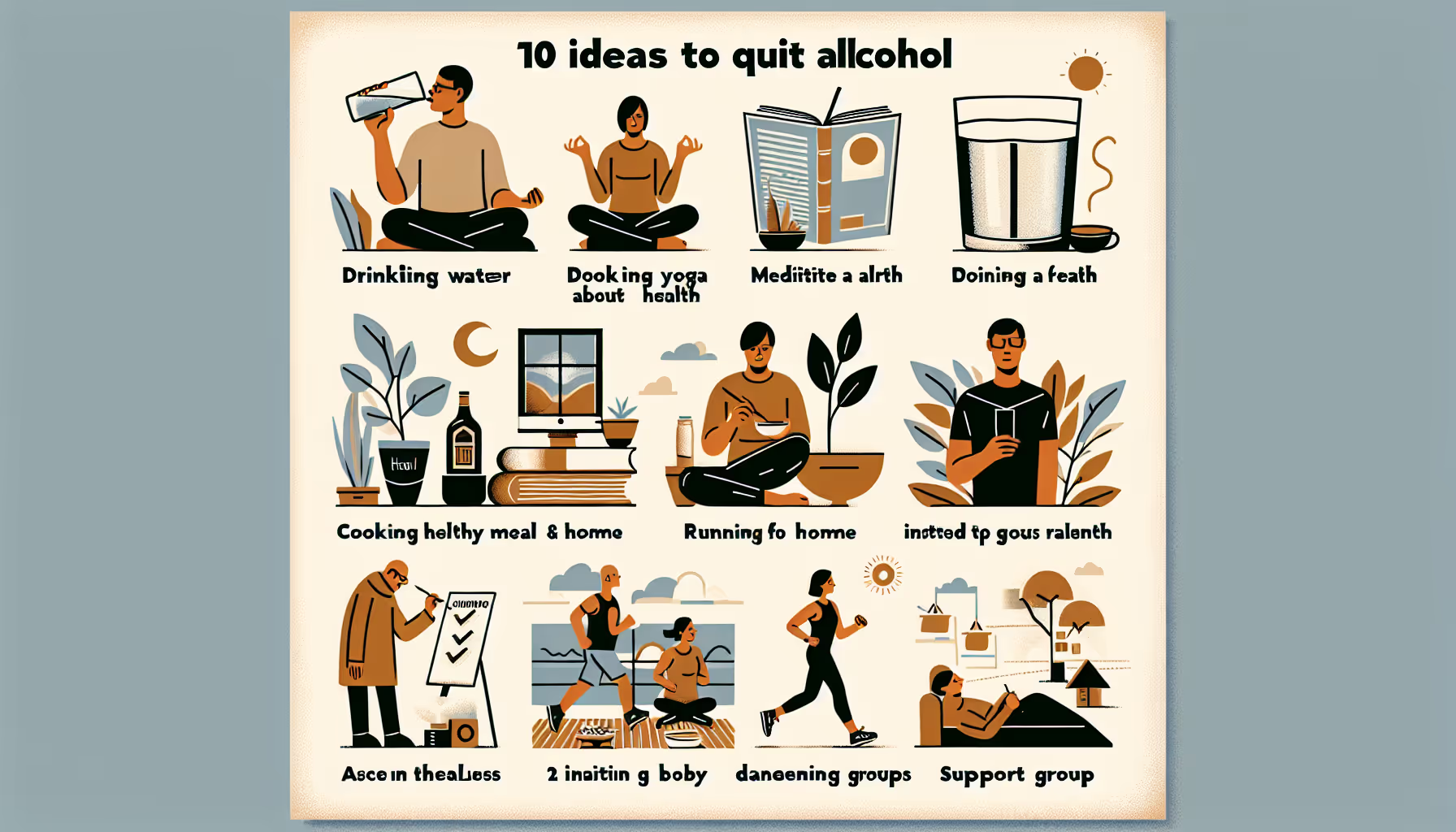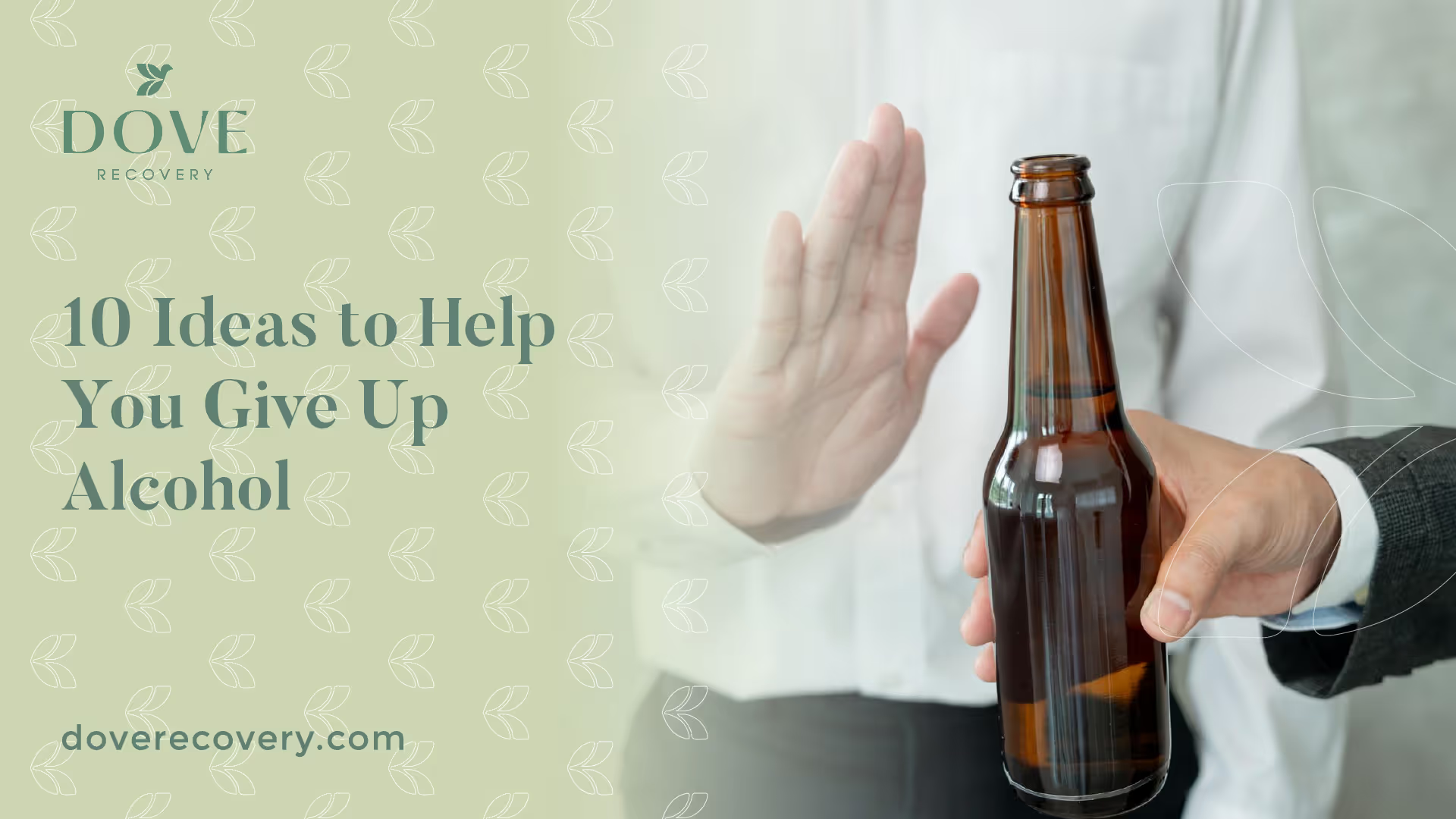10 Ideas to Help You Give Up Alcohol

Strategies to Reduce Alcohol Consumption
Taking the first step towards reducing alcohol consumption can be challenging. However, there are proven strategies that can assist in this journey, making it more manageable and rewarding. This section focuses on two effective methods: Peer Support Groups and Mindfulness Practices.
Peer Support Groups
Peer support groups serve as a robust mechanism to help individuals in their journey to give up alcohol. These groups offer a supportive environment where individuals can share experiences, learn from others, and receive the encouragement needed to stay committed to their decision.

According to the National Institute on Alcohol Abuse and Alcoholism (NIAAA), steps such as watching for peer pressure, keeping busy, asking for support, and being persistent can be incredibly beneficial for those aiming to curb their drinking habits.
Moreover, a review of ten studies published in the NCBI highlighted the positive effects of peer support groups in the treatment of addiction. This encompassed areas such as substance use, treatment engagement, and secondary substance-related behaviors such as craving and self-efficacy.
Mindfulness Practices
Incorporating mindfulness practices into daily routines can also be a powerful tool when giving up alcohol. Mindfulness can help individuals become more aware of their behaviors and triggers, empowering them to make healthier choices.
A daily meditation or mindfulness habit can be particularly useful during moments of intense cravings. This practice can help individuals stay present and focused, thereby reducing the likelihood of succumbing to temptation.
Research from Verywell Mind indicates that some damage to the brain, liver, heart, and gut caused by alcohol can slowly heal when individuals stop drinking. Although withdrawal symptoms can be severe, they are temporary. Once this stage is overcome, individuals start to feel better both physically and mentally, providing further motivation to continue on this path.
By leveraging the power of community through peer support groups and harnessing inner strength through mindfulness practices, individuals can navigate the challenges of reducing alcohol consumption. These strategies can serve as key pillars in one's journey towards a healthier and more fulfilling life.
Healthy Alternatives to Alcohol
One of the most effective strategies to reduce alcohol consumption is to replace it with healthier alternatives. This can help to fulfill the habitual aspect of drinking without the negative health effects. Let's explore two of these alternatives: crafting mocktails and participating in community activities.
Crafting Mocktails
Crafting mocktails is not just a great way to replace alcohol, but also an opportunity to tap into creativity. These alcohol-free beverages can be just as satisfying and flavorful as their alcoholic counterparts. From simple syrups to sparkling sodas, the possibilities are endless, and adding beautiful garnishes can make the experience feel even more special. Here are seven unique syrups you can start with.
Moreover, there is a variety of alcohol-free options available in the market today that mimic the taste of beers, ciders, wines, and spirits. These can be used as the base for your mocktails, providing the taste you might crave without the negative health effects.
Another engaging and healthy alternative could be baking. It can help calm the mind and provide a switch-off activity. Try out healthy baking options like beetroot brownies and banana pancakes.
Participating in Community Activities
Participation in community activities offers a dual benefit. Not only does it serve as a distraction from alcohol, but it also provides an opportunity to socialize and meet new people.
One such activity could be a photo walk. This involves exploring your neighborhood through a new lens, literally and figuratively. It can be a fun and creative way to spend time that might have otherwise been spent on drinking. You could even invite a friend along to make it a social call [2].
Another option is participating in a community cleanup. This not only gives a sense of accomplishment but also helps in building a sense of community. Plus, it offers a chance to meet your neighbors and make new friends. Here is a handy guide to planning a cleanup, no matter where you’re at [2].
Creating alcohol-free alternatives and engaging in community activities are just a couple of the many ways in which you can reduce alcohol consumption. Remember, the journey of giving up alcohol is unique for everyone, so find what works best for you and embrace it.
Health Benefits of Quitting Alcohol
Abstaining from alcohol can result in numerous physical and mental health benefits. As part of the journey to give up alcohol, it's crucial to understand these potential benefits as they serve as motivation and reassurance of the positive impact this lifestyle change can have.
Physical Benefits
Foremost among the physical benefits of quitting alcohol is the potential for bodily healing. Research shows that some damage to your brain, liver, heart, and gut caused by alcohol will slowly heal when you stop drinking.
Other significant physical benefits include:
- Improved Skin Health: Alcohol consumption can lead to skin problems such as redness and discoloration. Quitting alcohol can lead to improved skin elasticity and a healthier complexion [4].
- Weight Management: Alcoholic beverages are a source of added sugar and empty calories. Binge drinking can lead to consuming an extra 600 calories or more in a day. Hence, quitting alcohol can support weight management efforts.
- Improved Nutrition: Alcohol can negatively affect the digestion, storage, utilization, and excretion of nutrients. Abstaining from alcohol can help improve nutrition.
- Improved Immunity: Alcohol consumption can interfere with the body's immune system, making it harder to produce enough white blood cells to fight off germs and bacteria. Quitting alcohol can help improve immunity [4].
- Reduced Risk of Injuries: Cutting back drinking by a third can lower the number of injuries and sick days related to accidents significantly [5].
- Improved Liver Health: Heavy drinking can lead to liver issues such as fatty liver, cirrhosis, and other problems. However, the liver can repair itself and regenerate, making it beneficial to drink less or quit consuming alcohol.
Mental Benefits
Quitting alcohol can offer substantial mental health benefits as well. It can help alleviate depression, anxiety, and boost self-esteem by allowing individuals to focus on these aspects rather than alcohol consumption.
Furthermore, abstaining from alcohol can lead to improvements in relationships and work life, contributing to overall mental well-being. Moreover, reducing alcohol intake can help lower high blood pressure levels, contributing to a better mental state.
In conclusion, the benefits of quitting alcohol extend beyond the physical and mental health of an individual. It contributes to overall well-being, improved relationships, and a more fulfilling life. Therefore, incorporating strategies to reduce alcohol consumption can have far-reaching impacts on one's health and quality of life.
Lifestyle Changes for Alcohol Reduction
When looking for methods to reduce alcohol consumption, lifestyle changes can play a significant role. By engaging in new activities, hobbies, and experiences, one can create a fulfilling routine that does not revolve around alcohol. This not only offers alternatives to drinking but also provides opportunities for personal growth and community involvement.
Engaging in Hobbies
A primary strategy for reducing alcohol consumption is to engage in hobbies or find new interests. As Benenden suggests, joining an evening class can provide an excellent opportunity for this. Evening classes allow individuals to broaden their skillset and meet like-minded people in a supportive and engaging environment. This can include a variety of activities, such as sewing, bread making, or learning a new language.
Engaging in hobbies not only occupies time that might otherwise be spent drinking, but it also provides the satisfaction of learning something new. Additionally, hobbies can offer positive reinforcement and a sense of achievement, further motivating individuals to continue their journey towards reducing alcohol consumption.
Volunteering Opportunities
Another effective lifestyle change is to seek volunteering opportunities within the community. Volunteering offers a sense of purpose, connections to the community, and the opportunity to make new friends while helping others in need [3]. This experience can be incredibly fulfilling and rewarding, providing a positive influence that can aid in the reduction of alcohol consumption.
From helping out at a local food bank to participating in community cleanups or mentorship programs, there are countless ways to get involved. These opportunities not only enhance the community but also contribute to personal growth and self-esteem, providing further motivation to maintain a lifestyle free from excessive alcohol consumption.
Incorporating these lifestyle changes into daily routines can greatly contribute to alcohol reduction efforts. By focusing on personal growth, community involvement, and new experiences, individuals can find fulfilling alternatives to alcohol consumption and embark on a healthier and more satisfying journey.
Effective Prevention Programs
Prevention programs play a vital role in fostering a society that's aware of the risks associated with alcohol abuse. It's essential to implement strategies aimed at reducing high-risk alcohol use, and the most successful ones often utilize a multi-component approach, combining educational initiatives with environmental changes Source).
School-Based Initiatives
School-based programs are a common preventive strategy. The most widely used program in the US was Drug Abuse Resistance Education (DARE), a primary prevention program for 5th or 6th-grade students. Despite years of implementation, this program showed negligible effects on preventing drug and alcohol use Source).
However, a review of college-based programs indicated that individual interventions were among the most effective programming strategies. Specifically, brief motivational techniques, decision evaluation training, and norm assessments were found to be most effective Source).
It's noteworthy that both successes and failures in school-based prevention programs provide valuable insights on how to structure effective initiatives. These programs need to be tailored to the students' developmental level and should be relevant to their immediate social environment.
Family-Focused Interventions
Family-based primary prevention programs targeting at-risk children have proven to be efficacious for a wide range of social and health concerns. Interventions focusing on alcohol prevention have been primarily used with young children and adolescents Source).
Programs addressing the needs of school-age children have been reported to be effective in decreasing the initiation of alcohol use and subsequent use in the teenage years Source).
Family-focused interventions provide a supportive environment for children to learn about the risks associated with alcohol use. They also equip parents with the tools and resources to guide their children in making informed decisions regarding alcohol consumption.
These prevention programs, whether school-based or family-focused, are critical components in the broader strategy to reduce alcohol consumption. They offer education and support, helping individuals make healthier choices about alcohol use.
References
[1]: https://www.health.harvard.edu/staying-healthy/11-ways-to-curb-your-drinking
[2]: https://www.thegoodtrade.com/features/sober-things-to-do-instead-of-drinking-alcohol/
[3]: https://www.benenden.co.uk/be-healthy/lifestyle/10-brilliant-things-to-do-instead-of-drinking-in-january/
[4]: https://www.verywellmind.com/what-are-the-benefits-of-alcohol-recovery-67761
[5]: https://www.webmd.com/mental-health/addiction/ss/slideshow-quit-alcohol-effects
